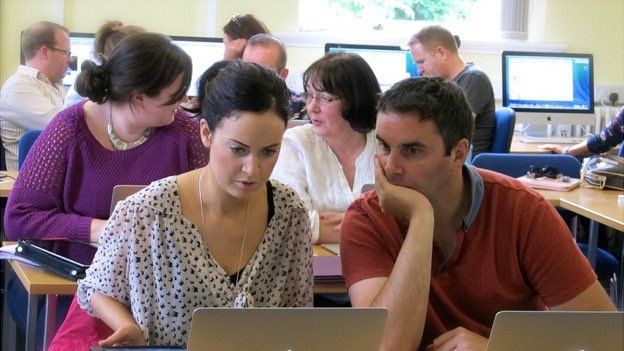Hi-tech schools rescuing an ancient language
- Published

Technology and education have a long, complicated and sometimes exaggerated relationship.
There's a school of thought that seems to suggest if you wave a laptop or something shiny and digital at the classroom, learning will somehow mysteriously improve.
Digital technology is associated with the classroom of the future. And if you throw iPads into the mix, you're even more likely to hear the language of an over-optimistic tomorrow.
So you might not expect to find tablet computers being deployed to defend a language first written down 1,700 years ago when "writing on a tablet" would have meant carving on a stone.
But in an innovative blend of ancient and modern, online technology is being used to keep alive teaching in the Irish language.
And Apple, the Californian technology giant, is using this schools project in the west of Ireland as a signpost for a much more ambitious, global application of iPads in education.
Lack of books
The problem that it's trying to solve is how to provide a full range of textbooks and teaching materials for a small, specialist, under-served area of education.
The number of schools in Ireland teaching through the Irish language has grown sharply in recent years, after near extinction in the early 1970s. But in total there are still fewer than 250 primary and secondary schools.
"It doesn't make sense for publishers to put money into translating text books from English," says Sean O'Gradaigh, lecturer in the school of education at the National University of Ireland, Galway.
He says you can Google any topic for teaching in English and find hundreds of textbooks and resources, but there are very few useful equivalents in Irish, because the market is too small.
It means there is demand from Irish language schools, but not enough resources to breathe life into the teaching.
Mr O'Gradaigh's response has been to use tablet computers - in this case iPads - to produce digital textbooks that can be downloaded and shared by Irish language schools.
The university in Galway is the teacher-training centre for schools teaching in Irish, and its students have become part of this digital self-publishing enterprise.
Carving on tablets
As part of their training, students are required to learn about educational technology. But Mr O'Gradaigh has some uncompromising views on this.
"Teaching technology is pointless, it's obsolete in two years," he said.
Instead 80 trainee teachers learn by making their own digital content and finding the best ways of using their own expanding library of materials.
In this contrast of old and new, the current cohort of student teachers use tablet computers throughout their training.
All their course materials are contained on iPads, and they use them to create and publish digital books.
Irish language schools are big users of technology, says Mr O'Gradaigh. In about three-quarters of secondary schools, all the teaching staff will have their own iPad. In one in five schools, every pupil will have their own.
The big picture here is that schools and academics have become the authors and publishers of their own specialist textbooks. And because it is online and digital, it can be replicated and shared immediately.
"There are schools which are deciding not to buy books any more," says Mr O'Gradaigh.
'No brainer'
It's not just about the Irish language.
His own subject is geography, and he says printed books are out of date within a few years.
The digital versions can be updated. But he says that just as important is that they can be "personalised and localised". Individual teachers can adapt materials for the needs of their individual class.
Mr O'Gradaigh sees the shift to digital publishing for schools as being a "no brainer".
And it's bubbling away as one of the next big things in educational technology.
Merlin John, an education technology commentator who is about to publish a book about using mobile devices, says schools are beginning to show how they can "personalise support materials and make considerable savings on textbooks through the use of digital devices".
'Create and curate'
In the UK, the Stephen Perse Foundation school in Cambridge, a recent winner of the Independent School of the Year award, has published digital materials for dozens of courses and made them free online through iTunes U.
It means that any pupils or other schools can download the resources created in this top-performing school for GCSEs, A-levels and International Baccalaureate subjects.
But it's not all tablets and Apple. Google's Chromebook and the Google Apps for Education have been challenging the iPad in the education sector, particularly in US schools.
This month, the New York City school system, with a million pupils, signed a deal supporting the use of Google apps for its schools, but leaving the final choice up to teachers.
Whether it's Apple or the Big Apple or the west of Ireland, who better than schools to know what schools need best?
Tricia Kelleher, head of the Stephen Perse Foundation school, said teachers could now "create and curate" their own content.
"This is not an experience offered by static textbooks," she said.
"Digital technology really does open up the possibility of schools becoming publishing houses."